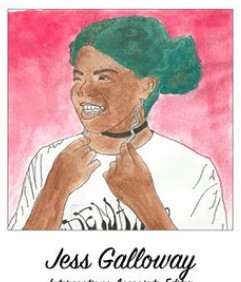Intersectional Confessional: Alternative black girl
The historical and systematic policing of black women’s bodies has not stopped at the legislative level, where rich, old, white men pass laws denying us the right to choose. It has not stopped with the trauma of police brutality and the catcalling in the streets. Black women are scrutinized even in the intricacies of their lifestyle choices, and it comes from all angles.
Growing up, my classmates and even my cousins would pick on me for the music I listened to. In elementary school, instead of bumping “Lollipop” by Lil Wayne (which is undoubtedly a banger), I was discovering the sounds of The Beatles and Frank Sinatra.

The teasing that ensued confused and hurt me to no end. Why would people judge me for the music I listen to? And it didn’t stop there. I was mocked for the way I spoke, the clothes I wore and even the way I ate my food (because apparently there is a way to “eat like a white girl?”).
The idea that listening to certain musicians or dying my hair certain colors negates any part of my blackness is not only plain ridiculous, but a tactic used to limit how creative and carefree a black woman can feel in expressing herself. It reduces us to rigid stereotypes that are simply unrealistic to expect of every black woman. White men can listen to any genre they please, but for a black woman to expand her creative horizons is an unacceptable display of “whiteness.”
I do listen to rap music. I do stan Beyonce. I do sometimes use AAVE. But I shouldn’t have to use these things to prove how “black” I am to anyone. I know the struggles I face everyday as a black woman in the South. I know the texture of my hair, pre-DivaCurl routine. I know the wealth of knowledge passed to me from the strong black women in my family. And none of this can be taken away from me, no matter how many times I’ve listened to Grizzly Bear’s brilliantly haunting debut studio album, “Horn of Plenty” this week.
Now that I’m older, I know about festivals like AfroPunk and zines like Shotgun Seamstress, where alternative blackness is validated and celebrated. But celebrating diversity within the black community should not only be limited to these spaces. Thankfully, women like Willow Smith, Amandla Stenberg and Yara Shahidi are showing young girls that it’s okay to sing Mac Demarco songs and dress however you want.
I’m still learning to live with the complexities of my own interests, how to exist outside of the box that society is constantly trying to fit me into and how to never compromise who I am for other’s expectations of me.
Your donation will support the student journalists of Tulane University. Your contribution will allow us to purchase equipment and cover our annual website hosting costs.


